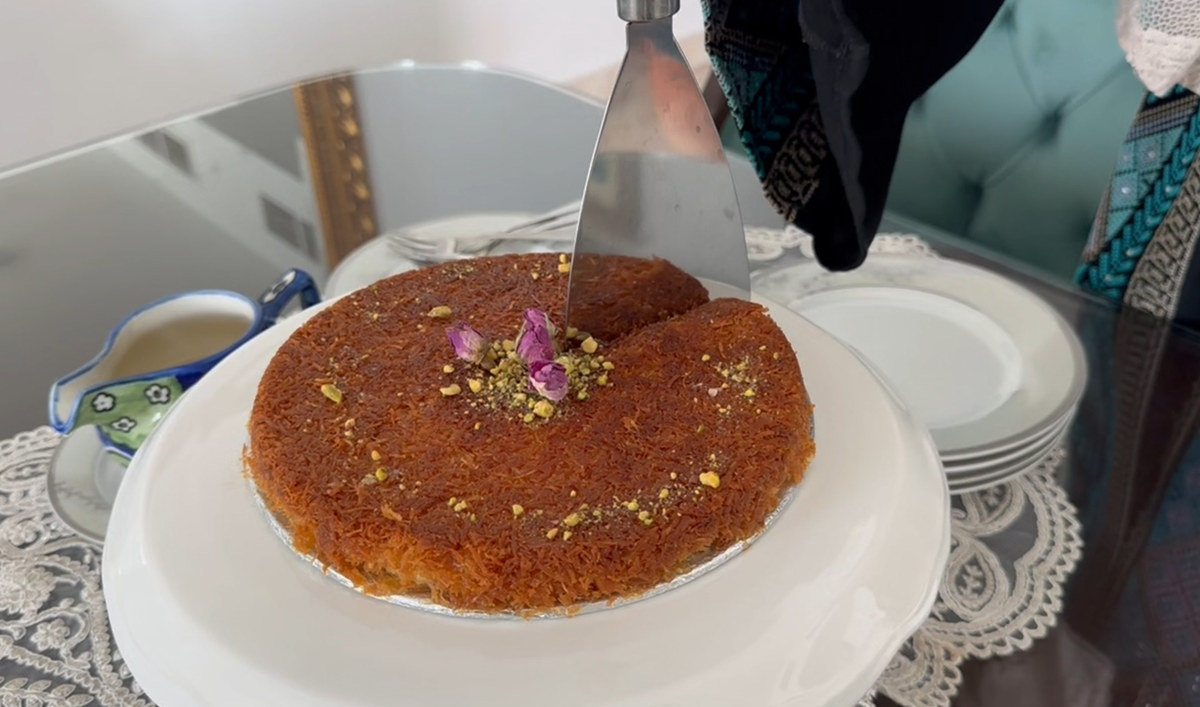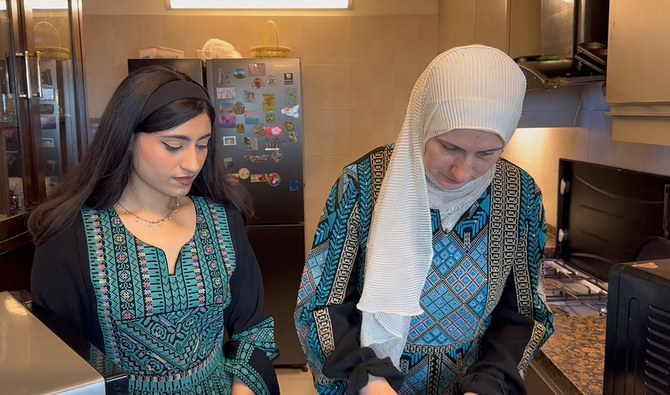KARACHI: Eman Al Hajj Ali, a Palestinian émigré with a background in electrical engineering and information technology, did not know she would carve a place for herself within the culinary landscape of Pakistan’s bustling Karachi city after arriving here with her family a year and a half ago because of her husband’s job.
Launching an online business named Palestine Sweets, she ventured into a field far from her formal training, armed with nothing but her mother’s traditional recipes. Ali is not a chef by training neither has she ever aspired to be an entrepreneur, yet she has made a noticeable impact on the lives of people around her while living in Pakistan’s biggest and most populous metropolis.
Middle Eastern cuisines are popular with people across Pakistan, resonating with the local palate due to their rich flavors and aromatic spices. But Karachi’s food scene is mostly dominated by people who either arrived there from India after the 1947 partition of the subcontinent or members of the Pashtun community from the country’s northwest, who are known for their passion for good food.

Eman Al Hajj Ali prepares kunafa at her residence in Karachi, Pakistan on Feb 28, 2024. (AN Photo)
“I have learned [these recipes] from my mom,” she told Arab News this week. “Some of these [recipes] I have, you know, created on my own, learning from here and there before tweaking them to come up with my own version.”
While both of Ali’s parents were born and raised in Palestine, she was born in Kuwait where her father worked at the time. She says she used to visit Palestine every summer until the Arab-Israel war in June 1967, when her family was living outside Palestine. Since the war, Ali’s family, like many other Palestinians, have not been allowed to go back to their home country.
Palestine Sweets is not just Ali’s initiative but also involves her daughters, Laila and Isra, who are both business graduates. Together the three described it as a heartfelt endeavor to share a slice of Palestine’s rich heritage with the people of Pakistan.
Especially since Ali says Pakistanis know little about Palestinians and associate the people of her country with only Israel’s war and occupation.
“They know very little about the culture,” she said. “And food is a great part of any culture. So, I thought that it would be lovely to introduce Palestinian desserts into the Pakistani community.”
So, Ali and her daughters started by introducing Pakistani customers to Kunafe, which Ali says is referred to as the “king of desserts” in Palestine.
Kunafe is a traditional Middle Eastern dessert, made with spun pastry and soaked in a sweet, sugar-based syrup. Although the dish has several variations depending on the region where it is prepared, Kunafe is typically layered with cheese, cream, or nuts.

Eman Al Hajj Ali (center), and her daughters Laila Al Qirim (right) and Isra Jaleel speak with Arab News at their residence in Karachi, Pakistan on Feb 28, 2024. (AN Photo)
Other Middle Eastern desserts offered by Palestine Sweets include Basbusa, cakes baked from semolina flour, and the Katayef dessert, stuffed pancakes often filled with nuts, spices, fruits and cheese.
Besides desserts, the online venture also offers customers the Maqluba, a traditional Middle Eastern rice dish that it serves with lamb’s meat and eggplant.
The prices of these desserts, which Ali and her daughters deliver from their apartment in Karachi’s Defense area through a delivery service, range between Rs1,000 ($3.6) and Rs2,250 ($8), which may vary according to the serving size.
Laila said Israel’s recent war on Gaza, which has killed over 29,000 people since October last year, triggered a lot of curiosity among Pakistanis about the people of Palestine, leading many to visit Palestine Sweets’ social media accounts and learn about their venture.
“With that increase in curiosity, a lot of people found their way to our page,” she told Arab News. ” And praise be to God, a lot of Karachiites have supported our business.”
But Laila was quick to clarify that that wasn’t the only reason for the venture’s success, saying that customers loved the unique and original Middle Eastern taste its dishes offered.
She cited the example of the Kunafe dish, saying that it is not made with any variations. She said what sets Palestine Sweets apart is that it is the only venture that offers authentic Middle Eastern desserts to people.
“It [Palestine Sweets] is fully run by Arabs and Palestinians, specifically,” Laila said. “We have our own original recipes.”
And it is paying off as well, according to Laila. A chunk of their customers are the adventurous ones who want to try out a new dish just to see what it tastes like, however, the bulk are regular ones.
“We have a lot of customers that are very, very loyal,” she said. “Some even order every week, at least once. It’s become a permanent part of their table.”
Some of their clients in Karachi are Arabs as well, who equally love their food items. But for very different reasons.
“They give me beautiful feedback that it is nostalgic,” Ali explained. “It took them back to memories with their grandparents and families back in the Middle East, especially when they have Katayef during Ramadan.”
















